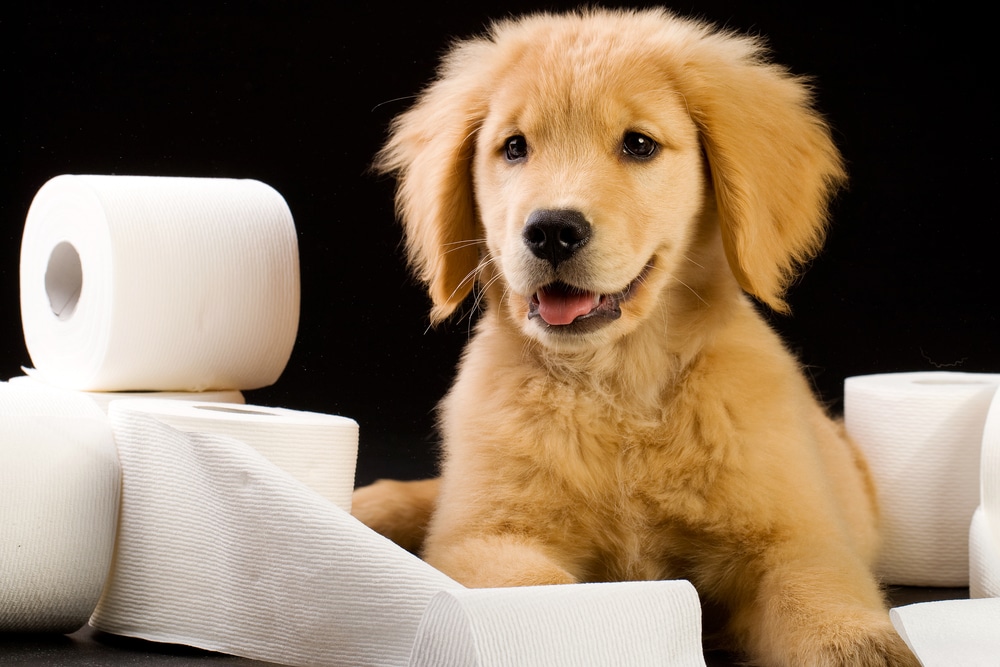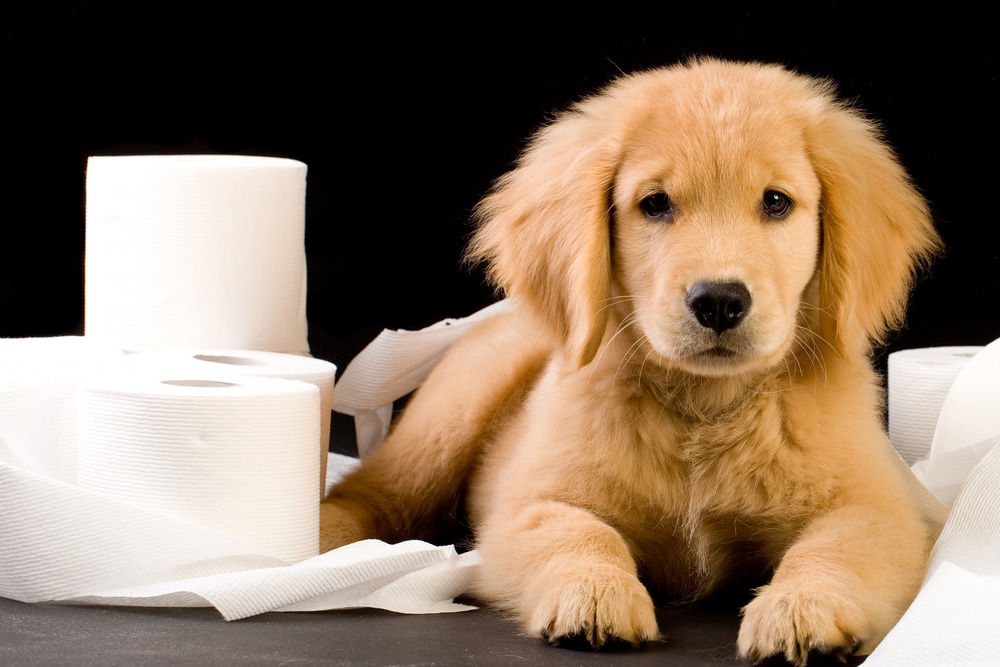Having a dog as a pet is one of the most rewarding experiences an individual can have, but it also comes with certain responsibilities. One of these responsibilities is housebreaking or potty training your new furry friend. Depending on the breed of dog, this process can be quite easy or more difficult. But are dogs really that difficult to potty train?
Dogs are not difficult to potty train if you begin at the right time and place. It largely depends on the individual dog, as well as the owner’s dedication and consistency when it comes to housebreaking. Some basic tips for potty training your dog include starting at a young age, having a designated potty area, rewarding your dog for going potty in the correct spot, encouraging your dog to use the potty-training pads, taking your dog outside regularly, avoiding scolding or punishing your dog if they have an accident, and keeping an eye on body language cues that indicate your dog needs to go out.
Table of Contents
- 11 Tips For Potty Training Your Dog
- 1. Start Training Your Dog At A Young Age
- 2. Get A Designated Potty Area
- 3. Reward Your Dog For Going Potty In The Correct Spot
- 4. Encourage Your Dog To Use The Potty-Training Pads
- 5. Take Your Dog Outside Regularly, Especially After Meals And Naps
- 6. Use A Crate Or Designated Potty Area Indoors Until Your Dog Is Fully Potty Trained
- 7. Avoid Scolding Or Punishing Your Dog If They Have An Accident
- 8. Keep An Eye On Body Language Cues That Indicate Your Dog Needs To Go Out
- 9. Clean Up Any Messes Quickly And Thoroughly
- 10. Have Patience – It Takes Time for Dogs To Learn This New Behavior
- 11. Seek Professional Help If You’re Having Difficulty Housebreaking Your Dog
- The Importance Of Potty Training Your Puppy
- How Long Does It Take To Potty Train A Dog?
- In Conclusion: Are Dogs Difficult To Potty Train?
11 Tips For Potty Training Your Dog

There are many ways to potty train a dog. The following are 11 tips that may help you successfully potty train your dog.
1. Start Training Your Dog At A Young Age
It is advantageous to start teaching your dog where and when to relieve themselves as early on as possible. Puppies typically learn more quickly than adult dogs, and it can be less difficult to get them started on the right track.
2. Get A Designated Potty Area
If you want your puppy to learn to go potty outside, it’s important they have their own designated potty area. This could be a spot in your backyard or even just a small area of grass near your front door. Once you’ve chosen the spot, take your puppy there regularly so they can get used to going in that specific area. When they’ve got the hang of it, you can start to phase out taking them to the designated potty area and instead just let them out in your backyard to do their business.
3. Reward Your Dog For Going Potty In The Correct Spot
You may need to experiment with a few different types of rewards before you find one that your dog really responds to. When your dog successfully eliminates (goes to the bathroom) in the right place, give them a treat or some other form of positive reinforcement. This will help them associate good things with going to the bathroom in the correct spot and will make them more likely to do so in the future.
Some dogs will do just about anything for a treat while others couldn’t care about food. Many dogs are highly motivated by toys, so try offering a favorite toy as a reward. You might also want to try using verbal praise as a reward.
If your dog does not seem motivated by any of these things, try using a combination of rewards. For example, you might give your dog a treat immediately after it goes potty in the correct spot and then follow up with a game of fetch or a belly rub.
4. Encourage Your Dog To Use The Potty-Training Pads
If you see your dog start to sniff around on the ground instead of playing or chewing on a toy, this is usually a sign that they have to potty. Gently pick up your puppy and place them onto the potty-training pads. If they don’t go right away, give them a few minutes before taking them off of the pads.
You may need to do this a few times before your puppy gets the hang of it, but eventually, they will associate being on the pads with having to potty and will start to use them on their own.
5. Take Your Dog Outside Regularly, Especially After Meals And Naps
Dogs need plenty of exercise, and taking them outside for a walk is a great way to give them the exercise they need. Walks are also a good opportunity for dogs to relieve themselves and get some fresh air. Make sure to take your dog for a walk after meals and naps when they’re likely to need to go to the bathroom.
This will help keep them from having accidents in the house and getting into mischief. A good rule of thumb is to take them out every two hours or so. If you can’t be home during the day, hire a dog walker or neighbor kid to help out.
6. Use A Crate Or Designated Potty Area Indoors Until Your Dog Is Fully Potty Trained
When potty training your dog, it is important to use a crate or designated potty area indoors until your dog is fully potty trained. By doing this, you’ll be able to monitor your dog’s bathroom habits better and know when it needs to go outside. This will help train your dog to only go to the bathroom in specific areas. Additionally, having a designated potty area will help prevent accidents inside your home.
When using a crate, make sure to take your dog out frequently, so it can be able to hold it in for a short period of time. With consistent training and supervision, your indoor dog will be fully potty trained in no time.
7. Avoid Scolding Or Punishing Your Dog If They Have An Accident
It can be really frustrating when your dog has an accident in the house, but it’s important to stay calm and avoid scolding or punishing them. This will only make your dog more anxious and less likely to want to use the bathroom in front of you. Instead, clean up the mess calmly and praise your dog when they go outside to do their business.
8. Keep An Eye On Body Language Cues That Indicate Your Dog Needs To Go Out
One of the most important things you can do to help your dog stay comfortable and avoid accidents in the house is to keep an eye on their body language cues. If your dog starts sniffing around or circling, they probably need to go out. Other cues to watch for include pacing, restlessness, and standing at the door. If you see any of these cues, take your dog out right away and give it a chance to relieve itself.
It’s also important to be aware of changes in your dog’s bathroom habits. If they are suddenly going more often or having accidents in the house, something may be wrong. This could be a sign of a health problem, so it’s important to talk to your vet right away.
9. Clean Up Any Messes Quickly And Thoroughly
If your dog has an accident in the house, it’s important to clean up the mess quickly and thoroughly. This will help prevent your dog from smelling the scent of urine or feces and wanting to use that spot again. Use a pet-safe cleaner, and be sure to scrub the area well. Consider using an enzymatic cleaner, which will help break down the scent of urine and feces.
10. Have Patience – It Takes Time for Dogs To Learn This New Behavior
One of the most important things to remember when potty training your dog is to have patience. It takes time for dogs to learn this new behavior, and it’s important not to get frustrated or give up. With consistency and positive reinforcement, your dog will be fully potty trained in no time.
11. Seek Professional Help If You’re Having Difficulty Housebreaking Your Dog
If you’re having difficulty housebreaking your dog, it may be time to seek professional help. A certified dog trainer can teach you how to properly potty train your dog and give you tips on dealing with common problems. Additionally, your vet can rule out any medical conditions that may be causing accidents in the house.
The Importance Of Potty Training Your Puppy
Potty training your puppy is an important part of responsible pet ownership. Here are some things to know:
- It can help to establish good habits that will last throughout the dog’s life.
- By taking the time to train your dog properly, you’ll help to prevent accidents in the house and keep your dog comfortable and happy.
- One of the best things about potty training your dog is it can help to bond with them. This is a great opportunity to spend some quality time with your pup and get to know them better.
- Additionally, potty training can help to prevent behavioral problems down the road. Dogs that are not properly trained are more likely to exhibit issues such as separation anxiety, aggression, and destructiveness.
- Potty training your dog at a young age can help ensure it will be able to live happily and comfortably in your home.
How Long Does It Take To Potty Train A Dog?
It usually takes around two to four weeks to potty train a dog. It’s important to be patient and consistent with your training methods.
The amount of time it takes to potty train a dog will vary depending on the individual dog. Some dogs may be able to learn quickly, while others may take longer.
In Conclusion: Are Dogs Difficult To Potty Train?
Dogs are not difficult and are, in fact, relatively easy to potty train if the owner is consistent with their methods and patient with the dog. The majority of dogs will be fully potty trained after a few weeks, but some may take longer. If you’re having difficulty potty training your dog, seek professional help from a certified dog trainer or veterinarian.
What has been your experience with potty training your pup? Do you have any tips to share? Let us know in the comments below!
